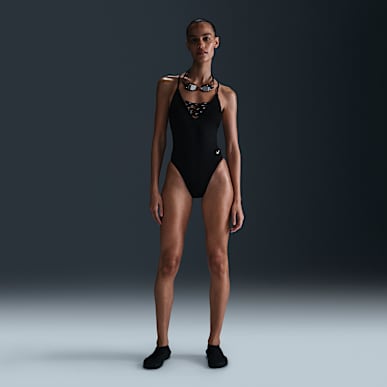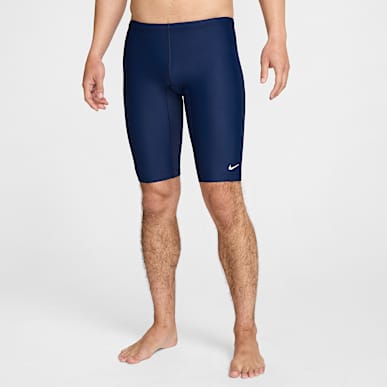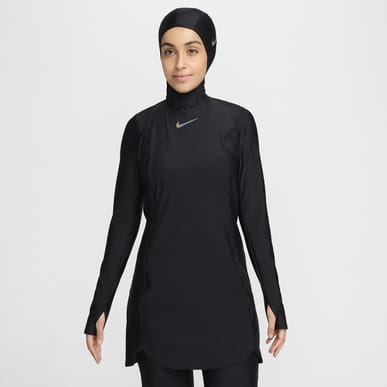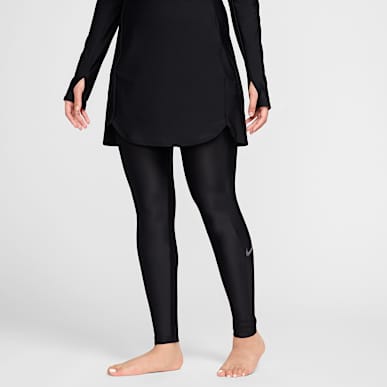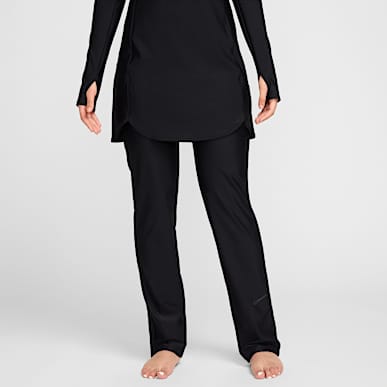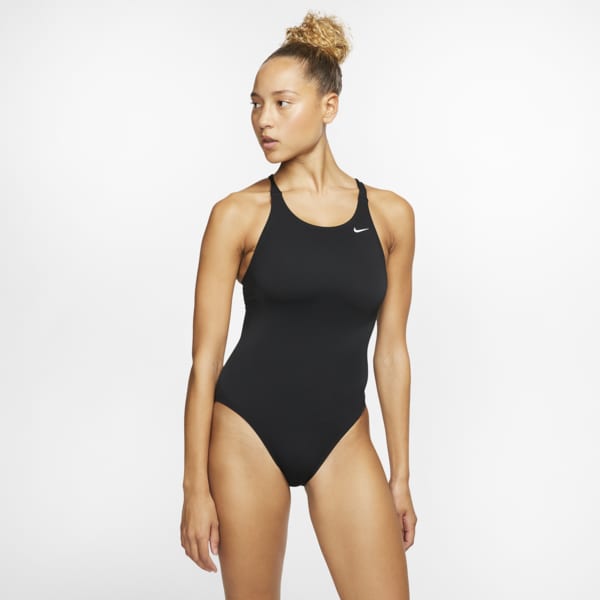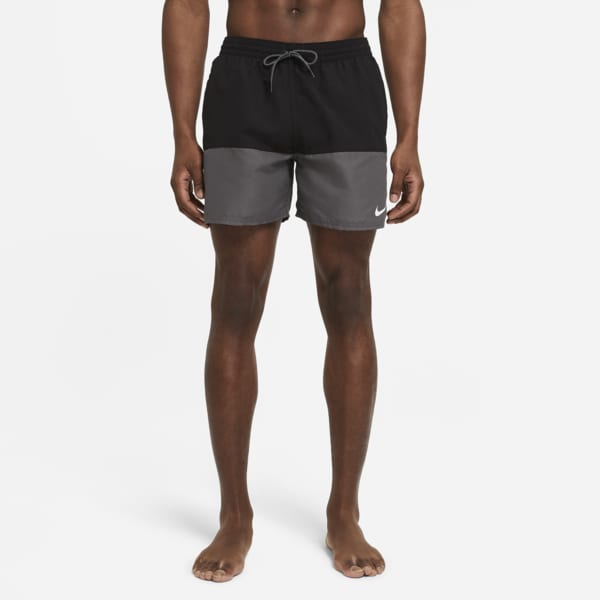Can You Swim on Your Period? Experts Explain
Health & Wellness
Doctors debunk the myth that swimming on your period is unsafe and explain how the exercise can ease symptoms.

If you're a menstruator who's ever got their period before a day of splishing, splashing or a swim meet, you've probably wondered: does my period have to put a damper on my water activities? Can I swim on my period?
Below, gynaecologists answer these and other relevant questions about how to swim on your period.
Can You Swim On Your Period—And Is It Safe?
Whether you own a set of inflatables or a slick racing suit, you can go swimming any day of the month—including the days you're menstruating, said Alyssa Dweck, M.D., O.B.G.Y.N. author of "The Complete A to Z for Your V" and INTIMINA sexual health expert.
"As long as you know how to swim, it is as safe for you to swim on your period as it is any other time", she said.
For the record: no matter what kind of water (pool, ocean, lake or something in between), it's generally safe to do so while menstruating.
According to Dweck, many people are afraid that treading in seawater while they bleed will attract sharks or other sharp-toothed swimmers. "But sharks aren't more likely to attack you while you bleed", she said.
Indeed, the International Shark Attack File reports that there is no evidence that people who are bleeding are more likely to be bitten by sharks than non-bleeders.
"Many people safely dive while menstruating, and we have continued to see no obvious pattern of increased attacks", the report stated.
Wait, will other people be able to tell that I have my period?
There's a common misconception that swimming on your period is unhygienic or messy.
Unfortunately, this myth gained steam in 2016 when a pool in Georgia put a sign up in the women's changing room which read, "Dear Ladies! Do not go in the pool during periods".
The sign implied that doing so was dirty, but nothing could be further from fact, according to Dweck.
If you use a menstrual product, it is highly unlikely that any blood will be released into the water while you swim, she said.
In the instance that your period starts while you're in the pool or other body of water, the amount of blood would be so small that it would easily be diluted by the rest of the water. Pools are also treated with chemicals that are powerful enough to kill any infectious pathogens that might be in any bodily fluid, blood included, according to the Centers for Disease Control.
Are there any benefits to swimming during your period?
"Regular exercise during menstruation is not only allowable but recommended to ease cramps and boost mood", Dweck said, adding that exercise promotes the release of endorphins.
Commonly known as 'the feel-good chemicals', endorphins are chemicals released by the brain and body in order to help the body naturally cope with pain and stress.
In addition to providing you with a euphoric feeling (think: runner's high) that boosts your mood, Dweck said a rush of endorphins from exercise can help naturally quell some of your painful period symptoms.
Indeed, one 2018 study published in the Journal of Education and Health Promotion found that those who performed regular aerobic exercise while menstruating experienced less period pain compared with those who did not exercise.
In short, if your period is plaguing you with a handful of painful symptoms, swimming could be as beneficial as taking some pain relievers.
Are there any times when you shouldn't swim while menstruating?
Of course, swimming (and other forms of exercise) can only help so much. If you're in serious pain or discomfort, talk to your gynaecologist or relevant doctor. Your healthcare provider will be able to determine if your debilitating symptoms are caused by another underlying condition, said Felice Gersh, M.D., author of "PCOS SOS: A Gynecologist's Lifeline To Naturally Restore Your Rhythms, Hormones, and Happiness".
Dweck said, "If you are experiencing severe cramping, fatigue or just general menstrual misery, swimming and other forms of exercise might carry more risk than benefit".
Just think about how scary (and dangerous) it would be to get hit with a wave of weakness while hanging out in the deep end or in the middle of a lake. To reiterate: if you don't know how to swim (or just don't love the water), there are plenty of other forms of exercise such as running, walking or yoga that can help score a hit of feel-good endorphins.
RELATED: The Top 9 Reasons To Start Running
Does it matter what type of menstrual product you use?
You may have heard that your period pauses when you're in the water, but that's actually not true, Dweck said.
"It's a myth that your period stops altogether when you get into the water", she said. While it's unlikely that you'll leave a trail of blood in the ocean or pool if you free bleed, it doesn't mean that your cycle doesn't let up. The best way to come prepared to a swimming session while on your period is to wear an insertable menstrual product.
"Pads and panty liners are out because they get waterlogged immediately and, therefore, would not be able to absorb any blood", she said. Plus, the absorbency of the pad or panty liner can weigh you down while you're in the water.
So, can you swim with a tampon? Tampons are an OK option, Dweck said.
"But sometimes they become saturated with chlorinated, salty or bacteria-filled water", she said. That means they're not nearly as long-lasting in water as they are when you're on land. It also means that they can cause irritation and even infection in some cases.
"If you do wear a tampon, I recommend removing it soon after you swim and replacing it with a new one", Dweck said. Otherwise, the chlorine or bacteria absorbed into the tampon could irritate the delicate tissues of your vaginal canal, and even in some cases lead to uncomfortable infections like bacterial vaginosis or yeast infections, she said.
Ultimately, Dweck explained that the best option is a menstrual cup or disc, if you can tolerate them, and they're accessible to you. "[These products] collect flow rather than absorbing it, which means you don't have to worry about them absorbing pool or ocean water", she said.
Now that you know (and hopefully believe!) that you can swim safely while on your period, it's time to readjust any expectations you may have around your pool workout.
The Bottom Line
If you know how to swim, you can swim on your period. Actually, experts say doing so can make some period symptoms less noticeable. Pick the right menstrual product for you, and always listen to your body. If you get hit with a wave of nausea, fatigue or weakness while in the water, consider hopping out and sticking to dry land exercise (or rest) until your symptoms lessen.
For more fitness and health tips, make sure you download the Nike Training Club App!
Words by Gabrielle Kassel
